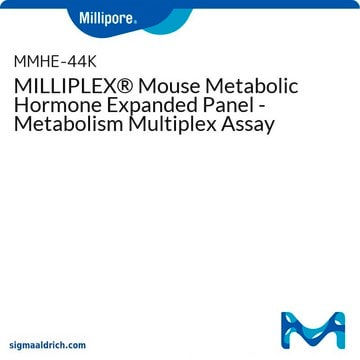MPTMAG-49K
MILLIPLEX® Mouse Pituitary Magnetic Bead Panel - Endocrine Multiplex Assay
The analytes available for this multiplex kit are: ACTH, BDNF, FSH, GH, Prolactin, TSH, LH.
About This Item
Recommended Products
Quality Level
species reactivity
mouse
manufacturer/tradename
Milliplex®
assay range
accuracy: 96-101%
standard curve range: 12.2-50,000 pg/mL
(TSH)
standard curve range: 122-500,000 pg/mL
(Prolactin)
standard curve range: 2.4-10,000 pg/mL
(ACTH)
standard curve range: 2.4-10,000 pg/mL
(BDNF)
standard curve range: 24.4-100,000 pg/mL
(FSH)
standard curve range: 4.9-20,000 pg/mL
(GH)
standard curve range: 4.9-20,000 pg/mL
(LH)
inter-assay cv: <20%
intra-assay cv: <15%
technique(s)
multiplexing: suitable
detection method
fluorometric (Luminex xMAP)
shipped in
wet ice
General description
MILLIPLEX® Mouse Pituitary Panel is a 7-plex kit to be used for the simultaneous quantification of any or all of the following analytes in mouse serum, plasma, and tissue culture samples: ACTH, BDNF, FSH, GH, Prolactin, TSH and LH. This kit uses a 96-well format, contains a lyophilized standard cocktail, two internal assay quality controls and can measure up to 38 samples in duplicate.
The Luminex® xMAP® platform uses a magnetic bead immunoassay format for ideal speed and sensitivity to quantitate multiple analytes simultaneously, dramatically improving productivity while conserving valuable sample volume.
Panel Type: Endocrine
Application
- Analytes: ACTH, BDNF, FSH, GH, LH, Prolactin, TSH
- Recommended Sample Type: Mouse serum, plasma, cell/tissue culture supernatants or lysates
- Recommended Sample Dilution: 10 μL per well of undiluted serum or plasma; cell/tissue culture samples may require dilution in an appropriate control medium.
- Assay Run Time: For greater sensitivity an overnight incubation is recommended, (16-18 hours) at 2-8°C. Alternatively, incubate for 2 hours at room temperature (20-25°C).
- Research Category: Endocrine
- Research Subcategory: Metabolism
Features and Benefits
Other Notes
Legal Information
Signal Word
Danger
Hazard Statements
Precautionary Statements
Hazard Classifications
Acute Tox. 3 Dermal - Acute Tox. 4 Inhalation - Acute Tox. 4 Oral - Aquatic Chronic 2 - Eye Irrit. 2 - Skin Irrit. 2 - Skin Sens. 1 - STOT SE 3
Target Organs
Respiratory system
Storage Class Code
6.1C - Combustible acute toxic Cat.3 / toxic compounds or compounds which causing chronic effects
Certificates of Analysis (COA)
Search for Certificates of Analysis (COA) by entering the products Lot/Batch Number. Lot and Batch Numbers can be found on a product’s label following the words ‘Lot’ or ‘Batch’.
Already Own This Product?
Find documentation for the products that you have recently purchased in the Document Library.
Our team of scientists has experience in all areas of research including Life Science, Material Science, Chemical Synthesis, Chromatography, Analytical and many others.
Contact Technical Service









